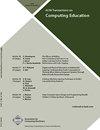没有先验知识的学生可以用ChatGPT答题吗?实证研究
IF 3.2
3区 工程技术
Q1 EDUCATION, SCIENTIFIC DISCIPLINES
引用次数: 0
摘要
随着全球对ChatGPT的巨大兴趣,教育界既兴奋又怀疑。为了正确评估它对教育的影响,了解它能在多大程度上帮助没有先验知识的学生回答评估问题是至关重要的。本研究旨在解决这个问题,以及问题类型的影响。我们对计算机工程专业的学生(实验组:n = 41 ~ 56)进行了多次实验,要求他们在学习相关主题之前使用ChatGPT回答之前的测试问题。然后将他们的分数与在测验或考试中回答相同问题的上一学期学生的分数进行比较(对照组:n = 24至61)。结果显示,根据问题类型和内容的不同,效应值范围从-2.55到1.23不等。实验组在回答代码分析和概念性问题时表现最好,但在回答代码完成和涉及图像的问题时表现不佳。另一方面,代码生成任务的性能不一致。总体而言,ChatGPT组的答案略落后于对照组的答案,效应值为- 0.16。我们的结论是,至少在本研究领域,ChatGPT还没有准备好让没有足够背景的学生来评估生成的答案。我们建议教育工作者尝试使用ChatGPT,并教育学生有效的提问技巧,以及如何评估所产生的回答。这项研究为ChatGPT在教育中的能力和局限性提供了见解,并为未来的研究和发展提供了信息。本文章由计算机程序翻译,如有差异,请以英文原文为准。
Can students without prior knowledge use ChatGPT to answer test questions? An empirical study
With the immense interest in ChatGPT worldwide, education has seen a mix of both excitement and skepticism. To properly evaluate its impact on education, it is crucial to understand how far it can help students without prior knowledge answer assessment questions. This study aims to address this question as well as the impact of the question type. We conducted multiple experiments with computer engineering students (experiment group: n = 41 to 56), who were asked to use ChatGPT to answer previous test questions before learning about the related topics. Their scores were then compared with the scores of previous-term students who answered the same questions in a quiz or exam setting (control group: n = 24 to 61). The results showed a wide range of effect sizes, from -2.55 to 1.23, depending on the question type and content. The experiment group performed best answering code analysis and conceptual questions but struggled with code completion and questions that involved images. On the other hand, the performance in code generation tasks was inconsistent. Overall, the ChatGPT group’s answers lagged slightly behind the control group’s answers with an effect size of − 0.16. We conclude that ChatGPT, at least in the field of this study, is not yet ready to rely on by students who don’t have sufficient background to evaluate generated answers. We suggest that educators try using ChatGPT and educate students on effective questioning techniques and how to assess the generated responses. This study provides insights into the capabilities and limitations of ChatGPT in education and informs future research and development.
求助全文
通过发布文献求助,成功后即可免费获取论文全文。
去求助
来源期刊

ACM Transactions on Computing Education
EDUCATION, SCIENTIFIC DISCIPLINES-
CiteScore
6.50
自引率
16.70%
发文量
66
期刊介绍:
ACM Transactions on Computing Education (TOCE) (formerly named JERIC, Journal on Educational Resources in Computing) covers diverse aspects of computing education: traditional computer science, computer engineering, information technology, and informatics; emerging aspects of computing; and applications of computing to other disciplines. The common characteristics shared by these papers are a scholarly approach to teaching and learning, a broad appeal to educational practitioners, and a clear connection to student learning.
 求助内容:
求助内容: 应助结果提醒方式:
应助结果提醒方式:


